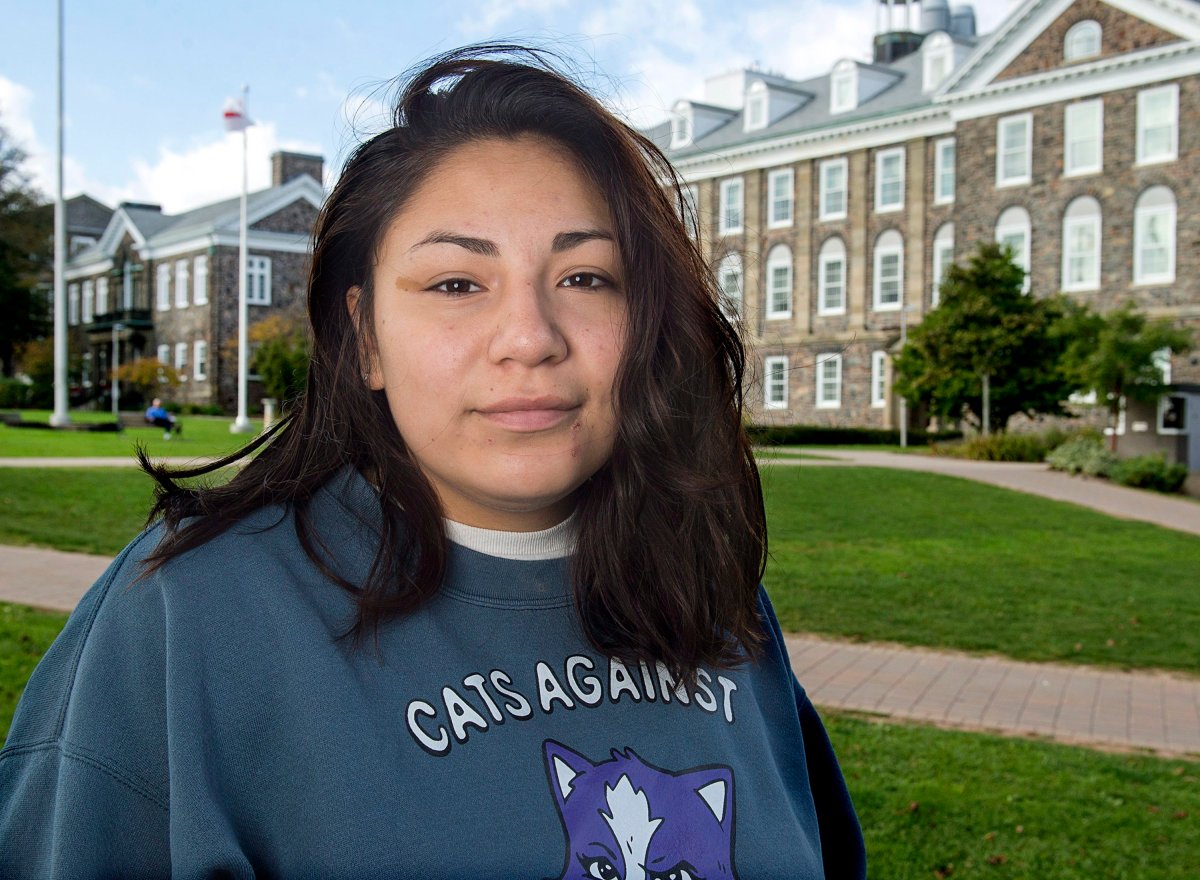An Indigenous member of Dalhousie University’s board of governors says she was subjected to institutionalized racism at a recent meeting, prompting an apology from the board’s chairman who insisted Dalhousie is not led by racists.

Kati George-Jim of the T’Sou-ke First Nation in British Columbia, a student representative on the Halifax university’s oversight board, says she was repeatedly interrupted, patronized and ignored at a meeting in June.
When she spoke up – admittedly breaking rules that govern the meetings – George-Jim says she was harshly reprimanded by the board chairman, Lawrence Stordy.
“The chair lost his temper. It was full-blown how you discipline a child,” she said in an interview Wednesday.
“He was yelling and no one in the room stopped him or challenged him.”
READ MORE: Residential school system contributed to current First Nations diabetes epidemic
After leaving the meeting in tears, George-Jim wrote a six-page letter to the board reflecting on what she called systemic racism at Dalhousie.
“The aggression I felt resonated through my body. I couldn’t breathe,” she said in the letter.
“The antagonistic reaction I endured from the chair is what I have been struggling to grasp.”
She read the letter at a board meeting Tuesday, something one board member said shows the university wants to hear her voice and work harder on equity, diversity and inclusion.
“I welcomed the letter by Kati because we have to deal with these issues head on,” said Kevin Hewitt, an ex-officio member of the board of governors, chairman of the senate and associate professor of physics and atmospheric science. “We’re not putting our heads in the sand thinking this doesn’t exist.”
“The fact that she was given an opportunity to speak uninterrupted is reflective of our efforts to deal with difficult issues of institutionalized racism and all the other ‘isms’ that are not unique to Dalhousie,” said Hewitt, who is African-Canadian. “She was provided with a platform and the time to express rightly her opinion on these issues … this is a positive step towards reconciliation.”
WATCH: ‘We failed’: Trudeau apologizes for Canada’s response to missing, murdered Indigenous women

Stordy said he apologized to George-Jim and that her views are very important to him, the board and the university at large.
“I was sorry she felt disrespected and wanted to make sure she knew we wanted to hear her voice,” he said in an email. “I truly regret the unintended impact that my comments had on Ms. George-Jim.”

Get daily National news
Stordy said George-Jim was given the “unique opportunity” to speak at length at Tuesday’s meeting, and said her voice is important as the university continues on the path to reconciliation.
The incident represents a blow for a university that has faced scandals in recent years.
READ MORE: Orange Shirt Day sees Edmontonians be part of reconciliation, remembrance
In late 2014, a group of male Dalhousie University School of Dentistry students were found posting misogynistic comments online about female classmates, a discovery that roiled the university for months.
Dalhousie was rocked by another online scandal less than a year later, when an Instagram account called The Dal Jungle with sexual photos of female students was exposed.
“The dentistry incident forced us to examine ourselves like in any crisis, and so the question of institutionalized racism was a part of those conversations that followed,” Hewitt said. “We have to work to become aware of implicit or unconscious bias that is a product of the society in which we exist.”
READ MORE: FSIN chief calls for further apology for ’60s Scoop
While Stordy called George-Jim’s speech “powerful,” noting that it touched on a number of things including missing Indigenous women, he took issue with the suggestion that he discriminated against her.
“No one on the board or in management is a racist obviously and we have promoted diversity tirelessly as a board strategic objective,” Stordy said.
George-Jim, a fourth-year political science student, called the incident “probably the most overt form of discrimination I have ever felt in my life,” but stopped short of calling board members racist.
“I’m not calling anyone racist,” she said. “Not one person is racist, it’s the system we work in and operate under.”
George-Jim added: “It’s entrenched in Dalhousie in general. I sit on a room full of portraits of old white guys staring down at me.”
WATCH: Rising above racism through sport: the historical story of black hockey players in Nova Scotia
_TOR1B98C_848x480_1072072259619.jpg?w=1040&quality=70&strip=all)
Candace Thomas, a member of Dalhousie’s board of governors and a partner at Halifax law firm Stewart McKelvey, said great strides have been made to increase diversity among the university’s governing body.
“The majority of people on the board are women, which is very unique when we look at university boards in Canada,” she said. “And we have other diverse voices within that.”
Thomas, an African-Nova Scotian from East Preston, said she could not recall details from the June meeting, but said there was no yelling.
“There was something that happened, and there was an apology made – a very sincere and honest apology,” she said. “I was a little surprised that it was still lingering, but those are her feelings.”
Thomas added it’s essential for students to have a voice in the governance of the university, but that the board chairman needs to give all members a chance to speak and maintain order.
Thomas said there are issues at large institutions, but that Dalhousie has made efforts to be inclusive.
“We each have a voice at the board,” she said. “We’re all given an opportunity to speak at every meeting that I have been at.”
Stordy, also a partner at Stewart McKelvey, said the board will continue to explore ways to make all members feel comfortable.
“While we are committed to effective board governance, this commitment will not override the principles of inclusion and respect,” said Stordy.







Comments